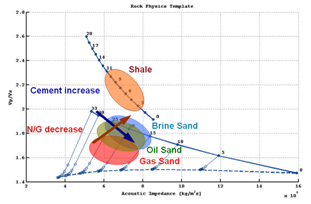Quantifying reservoir heterogeneities using deterministic and statistical petrophysics
PhD Bernardo Moyano
Main content
Supervisors: Tor Arne Johansen with Kyle Spikes (Univ. of Texas) and Phillip Doyen (UiB/CGGVeritas)
Funding: Through Petromaks-funded project Reservoir Monitoring and Dynamic Reservoir Characterization with Production, Seismic and Electromagnetic Data (2008-2011).
Rock heterogeneities affect porosity, fluid saturation and permeability of reservoirs, and hence the storage and effective displacement of hydrocarbons in subsurface reservoirs. For instance, thin and volumetrically insignificant shale layers can reduce reservoir quality and hinder the flow of hydrocarbons. A better understanding of the elastic and seismic signatures of heterogeneous reservoirs will improve our ability of their reliable characterization and monitoring.
The aim of this study is increase our ability to estimate reservoir quality from seismic information. Our particular interest is in the effect of dispersed clay (primary and/or diagenatic) versus layered clay (shale interlayers) on elastic properties and time-lapse response of a porous rock body. Once petrophysics models have been calibrated for both cases, the effect of lateral and vertical trends may be investigated by performing Monte Carlo simulations of depositional and depth-dependent parameters. Statistical rock physics (PDFs) templates of elastic attributes representative of various conditions will be developed and used to help interpret inverted seismic data in terms of lithology, rock heterogeneity and fluid content.
